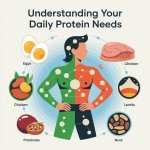If you’ve ever wondered, “How much protein should I eat?—you’re not alone. This is the most common question that comes to the mind of every person once in a lifetime. Protein plays a very important role in our lives as an essential nutrient that supports tissue repair, immune functions, muscle growth, and overall maintains the body’s balance. But the answer to the question is how many grams of protein per day I need, which depends on the lifestyle, age, activity level, body weight, etc. That is why it is essential to determine how many grams of protein per day are recommended by age to stay healthy and fit at different stages of life. In this blog, we know all the things that we follow to keep our body fit and healthy through the ideal protein intake at every life stage.
Protein is the most important nutrient that our body needs in a day, but figuring out how much protein you should eat can be confusing. However, the recommended dietary allowance for protein is 0.8 grams of protein per kilogram of body weight for adults or 0.36 grams per pound. But we look at people who have active lifestyles, those who go to the gym, build muscle, and athletes that amount may not be enough for those people. The amount of nutrients suggested by the RDA is the minimum amount that keeps you from getting sick. If you ask how much protein intake is necessary to eat in a day to maintain a good lifestyle, it depends on age, activity level, and health goals. For example, suppose a person goes to the gym every day to build muscle and may need 1.2 to 2.0 grams per kilogram of body weight, as compared to the average person.
As we grow old, the protein requirements in our body also evolve. The protein intake at each and every step of life is different. Proper protein intake leads us to a good and healthy life.
a. Children (4–13 years)
During childhood, the body is rapidly growing and developing, and protein intake at this stage is essential as it is the beginning stage. Kids need around 0.95 grams of protein per kilogram of body weight each day. To maintain a balanced diet. This includes a variety of rich protein foods that help the children grow stronger and healthier.
b. Teenagers (14–18 years)
At this stage, the body undergoes many changes, including hormonal and growth changes as they undergo puberty and increase their protein intake.
Boys: Around 52 grams per day
Girls: Around 46 grams per day
At this stage, protein supports muscle growth and fuels energy levels.
c. Adults (19–50 years)
The general guideline for adults is 0.8 grams per kilogram of body weight, but it is a minimum. If you’re active, working out, and trying to build muscle, your intake should increase to 1.2 to 2.0 grams per kilogram, depending on your lifestyle.
d. Older Adults (50+ years)
As we grow old, the body naturally declines muscle mass, and taking proper protein is very important at this stage.
Experts suggest increasing intake to 1.0 to 1.2 grams per kilogram of body weight for older adults. This helps to maintain strength and function, especially at this stage
Protein is the most important nutrient that our body needs in a day, but figuring out how much protein you should eat can be confusing. However, the recommended dietary allowance for protein is 0.8 grams of protein per kilogram of body weight for adults or 0.36 grams per pound. But we look at people who have active lifestyles, those who go to the gym, build muscle, and athletes that amount may not be enough for those people. The amount of nutrients suggested by the RDA is the minimum amount that keeps you from getting sick. If you ask how much protein intake is necessary to eat in a day to maintain a good lifestyle, it depends on age, activity level, and health goals. For example, suppose a person goes to the gym every day to build muscle and may need 1.2 to 2.0 grams per kilogram of body weight, as compared to the average person.
As we grow old, the protein requirements in our body also evolve. The protein intake at each and every step of life is different. Proper protein intake leads us to a good and healthy life.
a. Children (4–13 years)
During childhood, the body is rapidly growing and developing, and protein intake at this stage is essential as it is the beginning stage. Kids need around 0.95 grams of protein per kilogram of body weight each day. To maintain a balanced diet. This includes a variety of rich protein foods that help the children grow stronger and healthier.
b. Teenagers (14–18 years)
At this stage, the body undergoes many changes, including hormonal and growth changes as they undergo puberty and increase their protein intake.
Boys: Around 52 grams per day
Girls: Around 46 grams per day
At this stage, protein supports muscle growth and fuels energy levels.
c. Adults (19–50 years)
The general guideline for adults is 0.8 grams per kilogram of body weight, but it is a minimum. If you’re active, working out, and trying to build muscle, your intake should increase to 1.2 to 2.0 grams per kilogram, depending on your lifestyle.
d. Older Adults (50+ years)
As we grow old, the body naturally declines muscle mass, and taking proper protein is very important at this stage.
Experts suggest increasing intake to 1.0 to 1.2 grams per kilogram of body weight for older adults. This helps to maintain strength and function, especially at this stage
Attachments
Last edited by a moderator:

